Business Economics Report: Inflation in the UK and Government Role
VerifiedAdded on 2022/12/29
|9
|1917
|68
Report
AI Summary
This report provides a comprehensive analysis of business economics, focusing on the United Kingdom's economic background and the issue of inflation. It begins with an overview of the UK's economic landscape, highlighting its market-oriented and highly developed nature, including its GDP, global trade, and the dominance of the service sector, particularly financial services. The report then defines inflation, its impact on the economy, and its specific effects on businesses. It evaluates the causes and consequences of high inflation rates, including distortions in resource allocation, impact on debt, and the role of the government. The main body also explores the government's role in supporting business advancement and success, including providing financial support, technological assistance, and facilitating trade relations. The report concludes by summarizing the key findings, emphasizing the importance of understanding business economics and the impact of inflation on various economic factors such as wages and savings. The report is supported by references to academic sources.
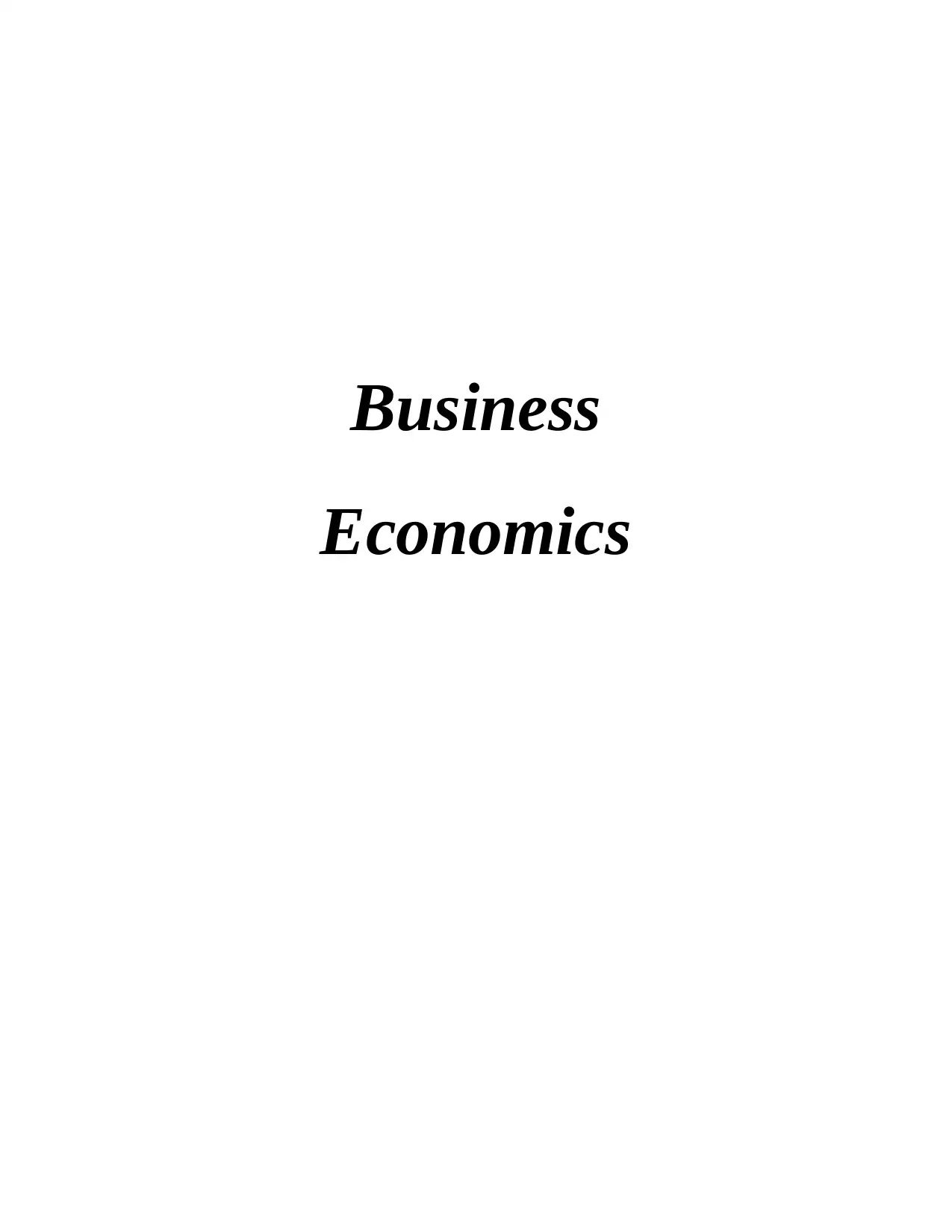
Business
Economics
Economics
Paraphrase This Document
Need a fresh take? Get an instant paraphrase of this document with our AI Paraphraser
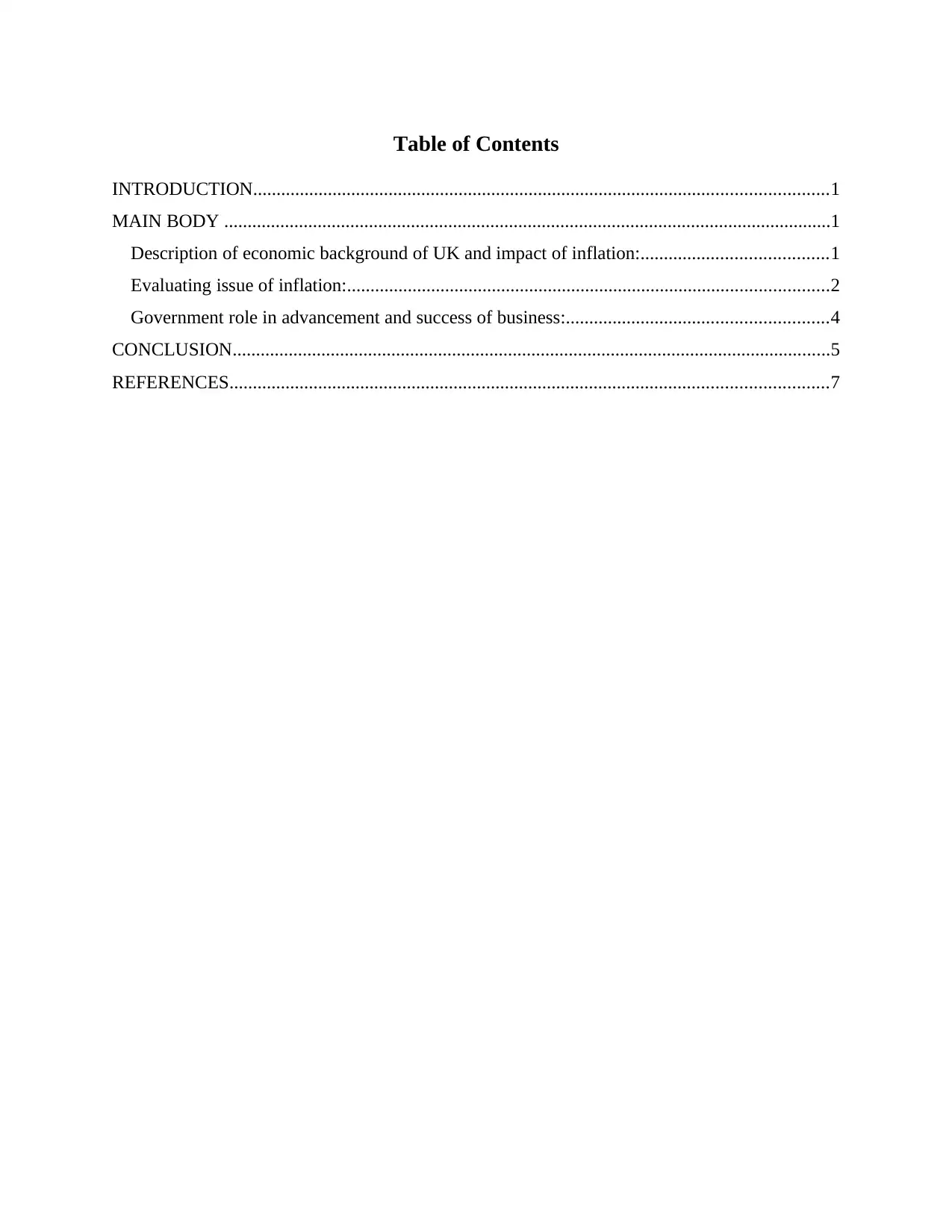
Table of Contents
INTRODUCTION...........................................................................................................................1
MAIN BODY ..................................................................................................................................1
Description of economic background of UK and impact of inflation:........................................1
Evaluating issue of inflation:.......................................................................................................2
Government role in advancement and success of business:........................................................4
CONCLUSION................................................................................................................................5
REFERENCES................................................................................................................................7
INTRODUCTION...........................................................................................................................1
MAIN BODY ..................................................................................................................................1
Description of economic background of UK and impact of inflation:........................................1
Evaluating issue of inflation:.......................................................................................................2
Government role in advancement and success of business:........................................................4
CONCLUSION................................................................................................................................5
REFERENCES................................................................................................................................7
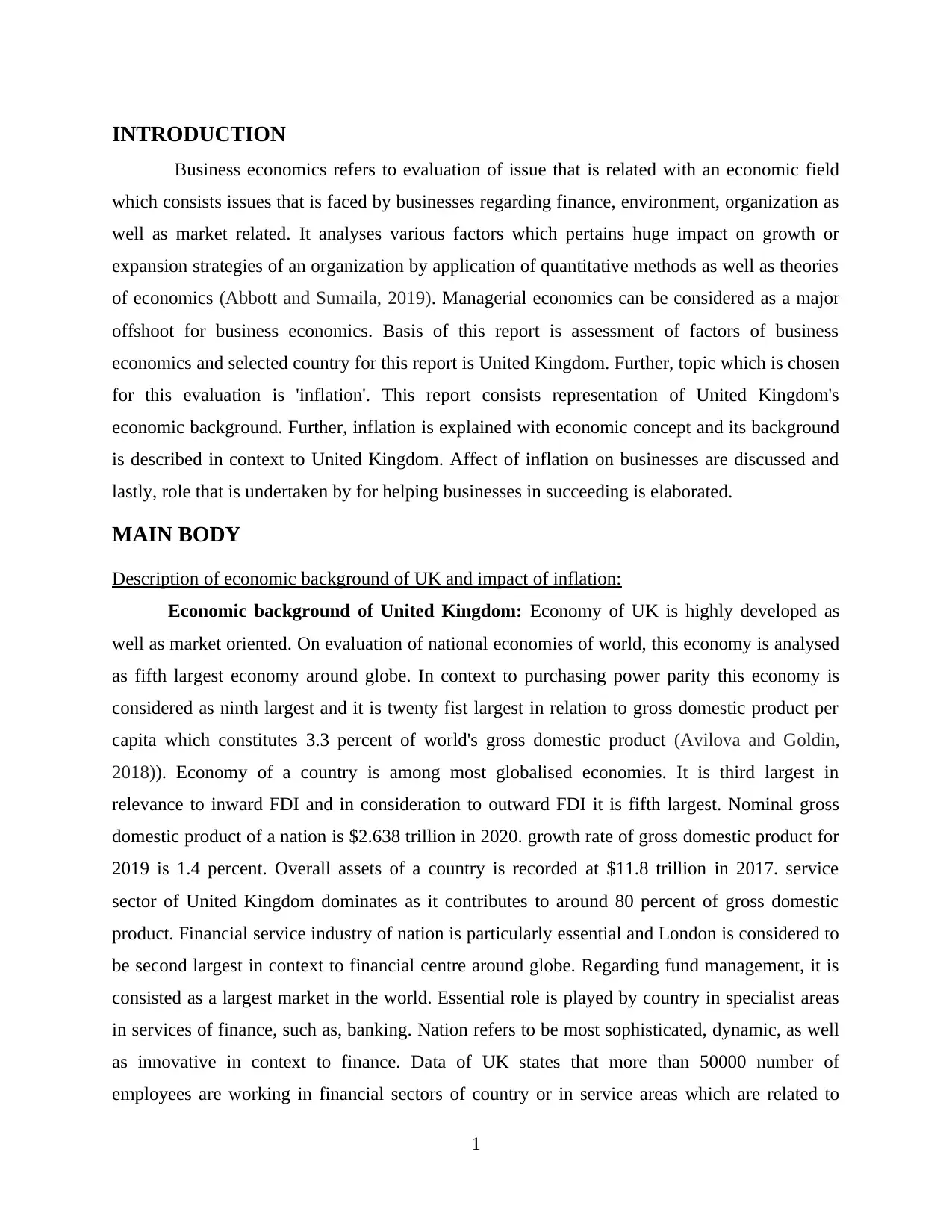
INTRODUCTION
Business economics refers to evaluation of issue that is related with an economic field
which consists issues that is faced by businesses regarding finance, environment, organization as
well as market related. It analyses various factors which pertains huge impact on growth or
expansion strategies of an organization by application of quantitative methods as well as theories
of economics (Abbott and Sumaila, 2019). Managerial economics can be considered as a major
offshoot for business economics. Basis of this report is assessment of factors of business
economics and selected country for this report is United Kingdom. Further, topic which is chosen
for this evaluation is 'inflation'. This report consists representation of United Kingdom's
economic background. Further, inflation is explained with economic concept and its background
is described in context to United Kingdom. Affect of inflation on businesses are discussed and
lastly, role that is undertaken by for helping businesses in succeeding is elaborated.
MAIN BODY
Description of economic background of UK and impact of inflation:
Economic background of United Kingdom: Economy of UK is highly developed as
well as market oriented. On evaluation of national economies of world, this economy is analysed
as fifth largest economy around globe. In context to purchasing power parity this economy is
considered as ninth largest and it is twenty fist largest in relation to gross domestic product per
capita which constitutes 3.3 percent of world's gross domestic product (Avilova and Goldin,
2018)). Economy of a country is among most globalised economies. It is third largest in
relevance to inward FDI and in consideration to outward FDI it is fifth largest. Nominal gross
domestic product of a nation is $2.638 trillion in 2020. growth rate of gross domestic product for
2019 is 1.4 percent. Overall assets of a country is recorded at $11.8 trillion in 2017. service
sector of United Kingdom dominates as it contributes to around 80 percent of gross domestic
product. Financial service industry of nation is particularly essential and London is considered to
be second largest in context to financial centre around globe. Regarding fund management, it is
consisted as a largest market in the world. Essential role is played by country in specialist areas
in services of finance, such as, banking. Nation refers to be most sophisticated, dynamic, as well
as innovative in context to finance. Data of UK states that more than 50000 number of
employees are working in financial sectors of country or in service areas which are related to
1
Business economics refers to evaluation of issue that is related with an economic field
which consists issues that is faced by businesses regarding finance, environment, organization as
well as market related. It analyses various factors which pertains huge impact on growth or
expansion strategies of an organization by application of quantitative methods as well as theories
of economics (Abbott and Sumaila, 2019). Managerial economics can be considered as a major
offshoot for business economics. Basis of this report is assessment of factors of business
economics and selected country for this report is United Kingdom. Further, topic which is chosen
for this evaluation is 'inflation'. This report consists representation of United Kingdom's
economic background. Further, inflation is explained with economic concept and its background
is described in context to United Kingdom. Affect of inflation on businesses are discussed and
lastly, role that is undertaken by for helping businesses in succeeding is elaborated.
MAIN BODY
Description of economic background of UK and impact of inflation:
Economic background of United Kingdom: Economy of UK is highly developed as
well as market oriented. On evaluation of national economies of world, this economy is analysed
as fifth largest economy around globe. In context to purchasing power parity this economy is
considered as ninth largest and it is twenty fist largest in relation to gross domestic product per
capita which constitutes 3.3 percent of world's gross domestic product (Avilova and Goldin,
2018)). Economy of a country is among most globalised economies. It is third largest in
relevance to inward FDI and in consideration to outward FDI it is fifth largest. Nominal gross
domestic product of a nation is $2.638 trillion in 2020. growth rate of gross domestic product for
2019 is 1.4 percent. Overall assets of a country is recorded at $11.8 trillion in 2017. service
sector of United Kingdom dominates as it contributes to around 80 percent of gross domestic
product. Financial service industry of nation is particularly essential and London is considered to
be second largest in context to financial centre around globe. Regarding fund management, it is
consisted as a largest market in the world. Essential role is played by country in specialist areas
in services of finance, such as, banking. Nation refers to be most sophisticated, dynamic, as well
as innovative in context to finance. Data of UK states that more than 50000 number of
employees are working in financial sectors of country or in service areas which are related to
1
⊘ This is a preview!⊘
Do you want full access?
Subscribe today to unlock all pages.

Trusted by 1+ million students worldwide
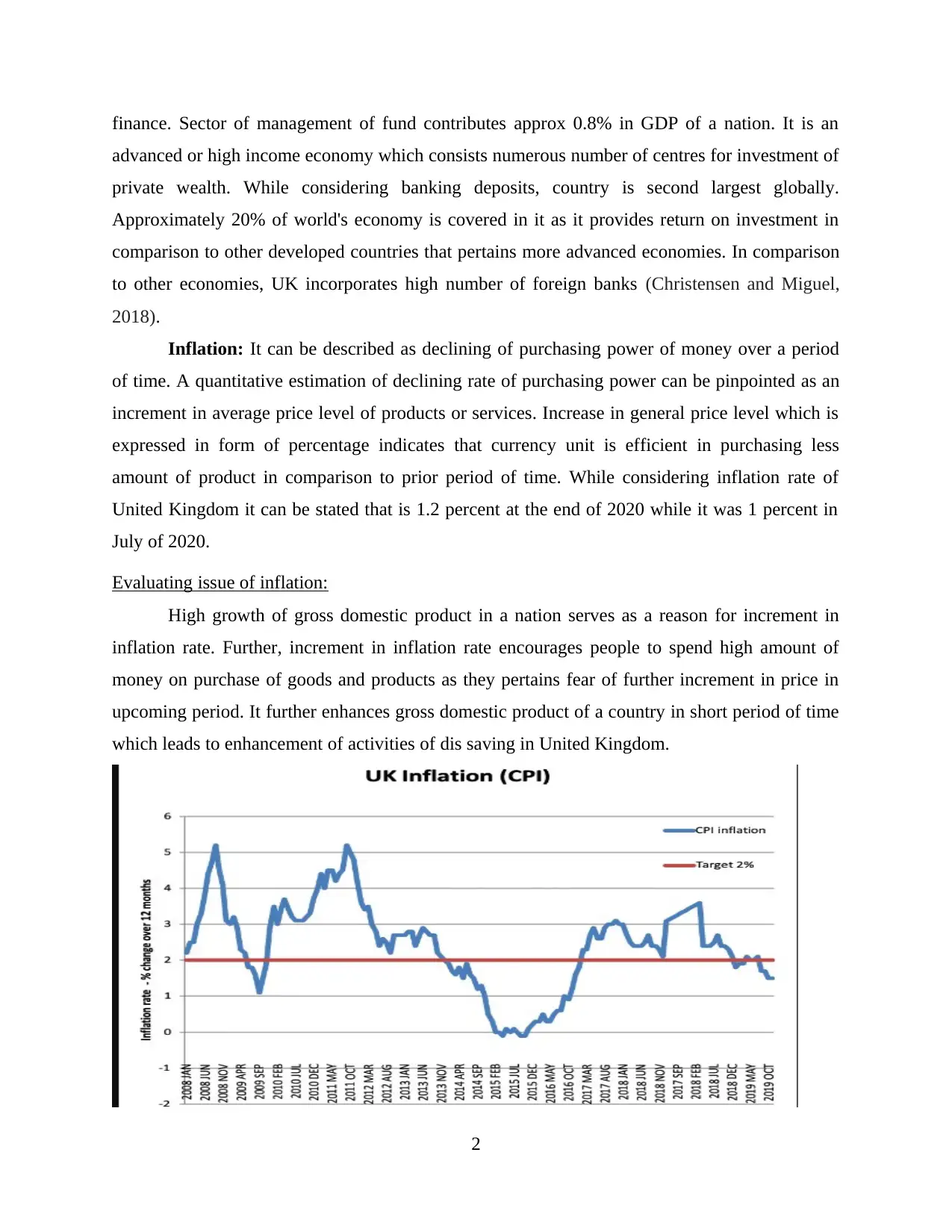
finance. Sector of management of fund contributes approx 0.8% in GDP of a nation. It is an
advanced or high income economy which consists numerous number of centres for investment of
private wealth. While considering banking deposits, country is second largest globally.
Approximately 20% of world's economy is covered in it as it provides return on investment in
comparison to other developed countries that pertains more advanced economies. In comparison
to other economies, UK incorporates high number of foreign banks (Christensen and Miguel,
2018).
Inflation: It can be described as declining of purchasing power of money over a period
of time. A quantitative estimation of declining rate of purchasing power can be pinpointed as an
increment in average price level of products or services. Increase in general price level which is
expressed in form of percentage indicates that currency unit is efficient in purchasing less
amount of product in comparison to prior period of time. While considering inflation rate of
United Kingdom it can be stated that is 1.2 percent at the end of 2020 while it was 1 percent in
July of 2020.
Evaluating issue of inflation:
High growth of gross domestic product in a nation serves as a reason for increment in
inflation rate. Further, increment in inflation rate encourages people to spend high amount of
money on purchase of goods and products as they pertains fear of further increment in price in
upcoming period. It further enhances gross domestic product of a country in short period of time
which leads to enhancement of activities of dis saving in United Kingdom.
2
advanced or high income economy which consists numerous number of centres for investment of
private wealth. While considering banking deposits, country is second largest globally.
Approximately 20% of world's economy is covered in it as it provides return on investment in
comparison to other developed countries that pertains more advanced economies. In comparison
to other economies, UK incorporates high number of foreign banks (Christensen and Miguel,
2018).
Inflation: It can be described as declining of purchasing power of money over a period
of time. A quantitative estimation of declining rate of purchasing power can be pinpointed as an
increment in average price level of products or services. Increase in general price level which is
expressed in form of percentage indicates that currency unit is efficient in purchasing less
amount of product in comparison to prior period of time. While considering inflation rate of
United Kingdom it can be stated that is 1.2 percent at the end of 2020 while it was 1 percent in
July of 2020.
Evaluating issue of inflation:
High growth of gross domestic product in a nation serves as a reason for increment in
inflation rate. Further, increment in inflation rate encourages people to spend high amount of
money on purchase of goods and products as they pertains fear of further increment in price in
upcoming period. It further enhances gross domestic product of a country in short period of time
which leads to enhancement of activities of dis saving in United Kingdom.
2
Paraphrase This Document
Need a fresh take? Get an instant paraphrase of this document with our AI Paraphraser
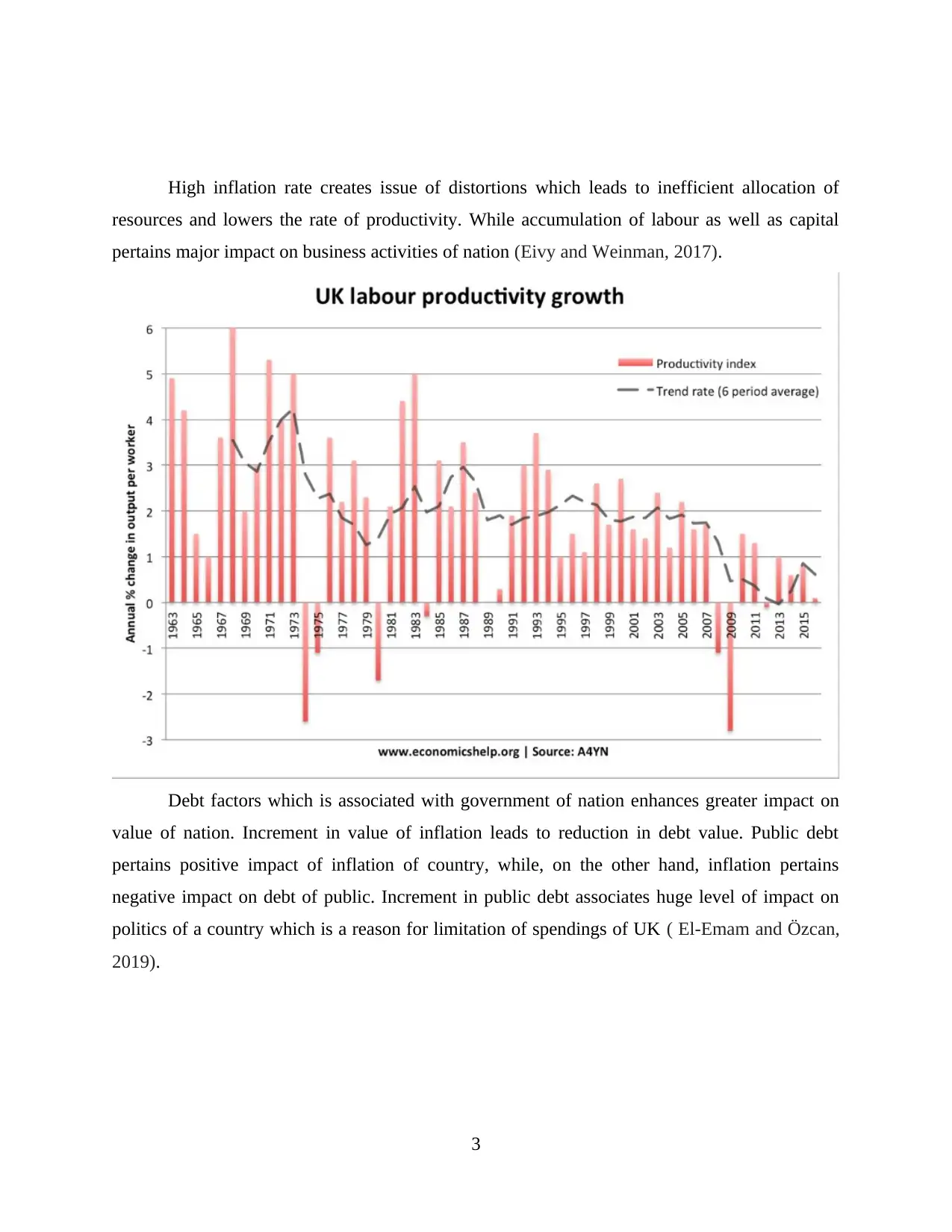
High inflation rate creates issue of distortions which leads to inefficient allocation of
resources and lowers the rate of productivity. While accumulation of labour as well as capital
pertains major impact on business activities of nation (Eivy and Weinman, 2017).
Debt factors which is associated with government of nation enhances greater impact on
value of nation. Increment in value of inflation leads to reduction in debt value. Public debt
pertains positive impact of inflation of country, while, on the other hand, inflation pertains
negative impact on debt of public. Increment in public debt associates huge level of impact on
politics of a country which is a reason for limitation of spendings of UK ( El-Emam and Özcan,
2019).
3
resources and lowers the rate of productivity. While accumulation of labour as well as capital
pertains major impact on business activities of nation (Eivy and Weinman, 2017).
Debt factors which is associated with government of nation enhances greater impact on
value of nation. Increment in value of inflation leads to reduction in debt value. Public debt
pertains positive impact of inflation of country, while, on the other hand, inflation pertains
negative impact on debt of public. Increment in public debt associates huge level of impact on
politics of a country which is a reason for limitation of spendings of UK ( El-Emam and Özcan,
2019).
3
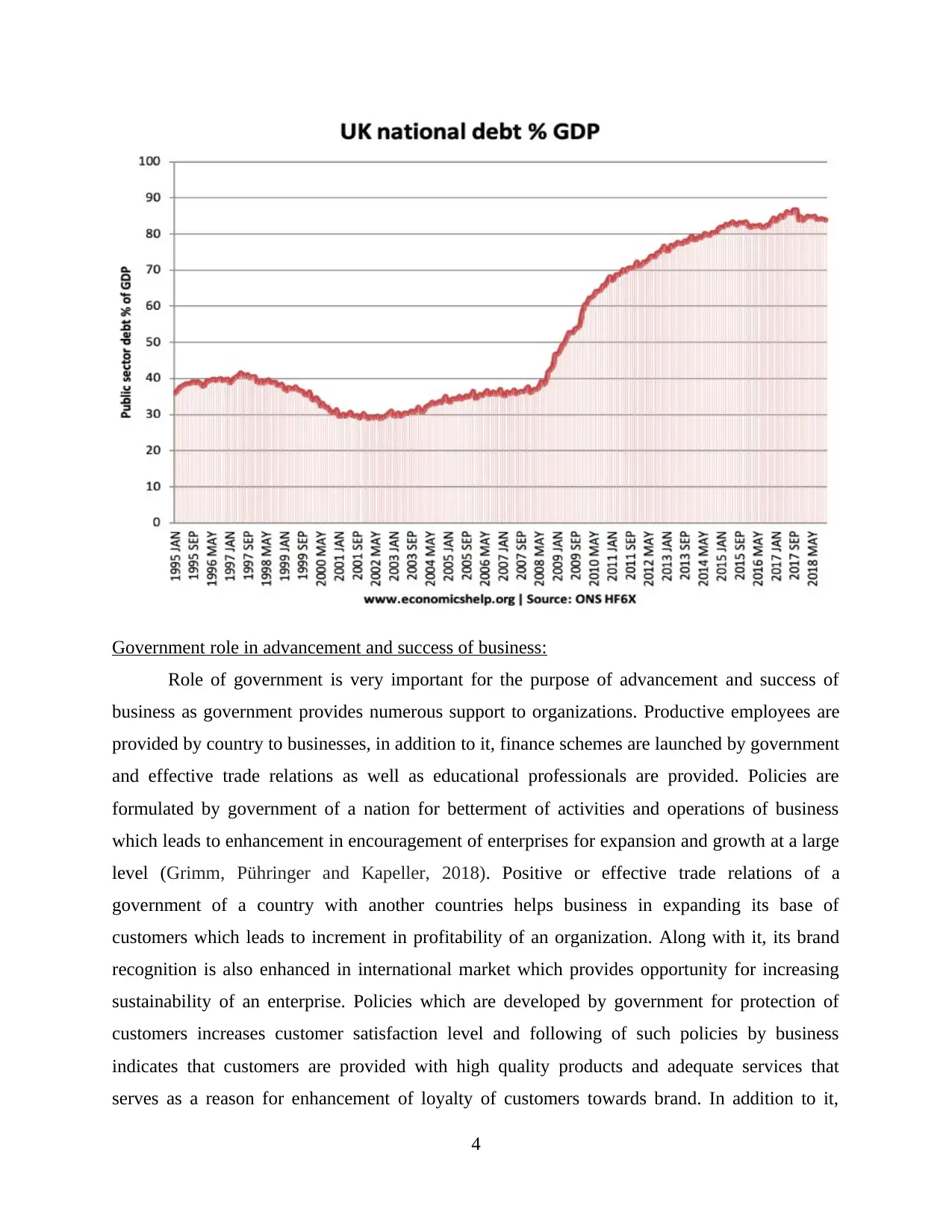
Government role in advancement and success of business:
Role of government is very important for the purpose of advancement and success of
business as government provides numerous support to organizations. Productive employees are
provided by country to businesses, in addition to it, finance schemes are launched by government
and effective trade relations as well as educational professionals are provided. Policies are
formulated by government of a nation for betterment of activities and operations of business
which leads to enhancement in encouragement of enterprises for expansion and growth at a large
level (Grimm, Pühringer and Kapeller, 2018). Positive or effective trade relations of a
government of a country with another countries helps business in expanding its base of
customers which leads to increment in profitability of an organization. Along with it, its brand
recognition is also enhanced in international market which provides opportunity for increasing
sustainability of an enterprise. Policies which are developed by government for protection of
customers increases customer satisfaction level and following of such policies by business
indicates that customers are provided with high quality products and adequate services that
serves as a reason for enhancement of loyalty of customers towards brand. In addition to it,
4
Role of government is very important for the purpose of advancement and success of
business as government provides numerous support to organizations. Productive employees are
provided by country to businesses, in addition to it, finance schemes are launched by government
and effective trade relations as well as educational professionals are provided. Policies are
formulated by government of a nation for betterment of activities and operations of business
which leads to enhancement in encouragement of enterprises for expansion and growth at a large
level (Grimm, Pühringer and Kapeller, 2018). Positive or effective trade relations of a
government of a country with another countries helps business in expanding its base of
customers which leads to increment in profitability of an organization. Along with it, its brand
recognition is also enhanced in international market which provides opportunity for increasing
sustainability of an enterprise. Policies which are developed by government for protection of
customers increases customer satisfaction level and following of such policies by business
indicates that customers are provided with high quality products and adequate services that
serves as a reason for enhancement of loyalty of customers towards brand. In addition to it,
4
⊘ This is a preview!⊘
Do you want full access?
Subscribe today to unlock all pages.

Trusted by 1+ million students worldwide
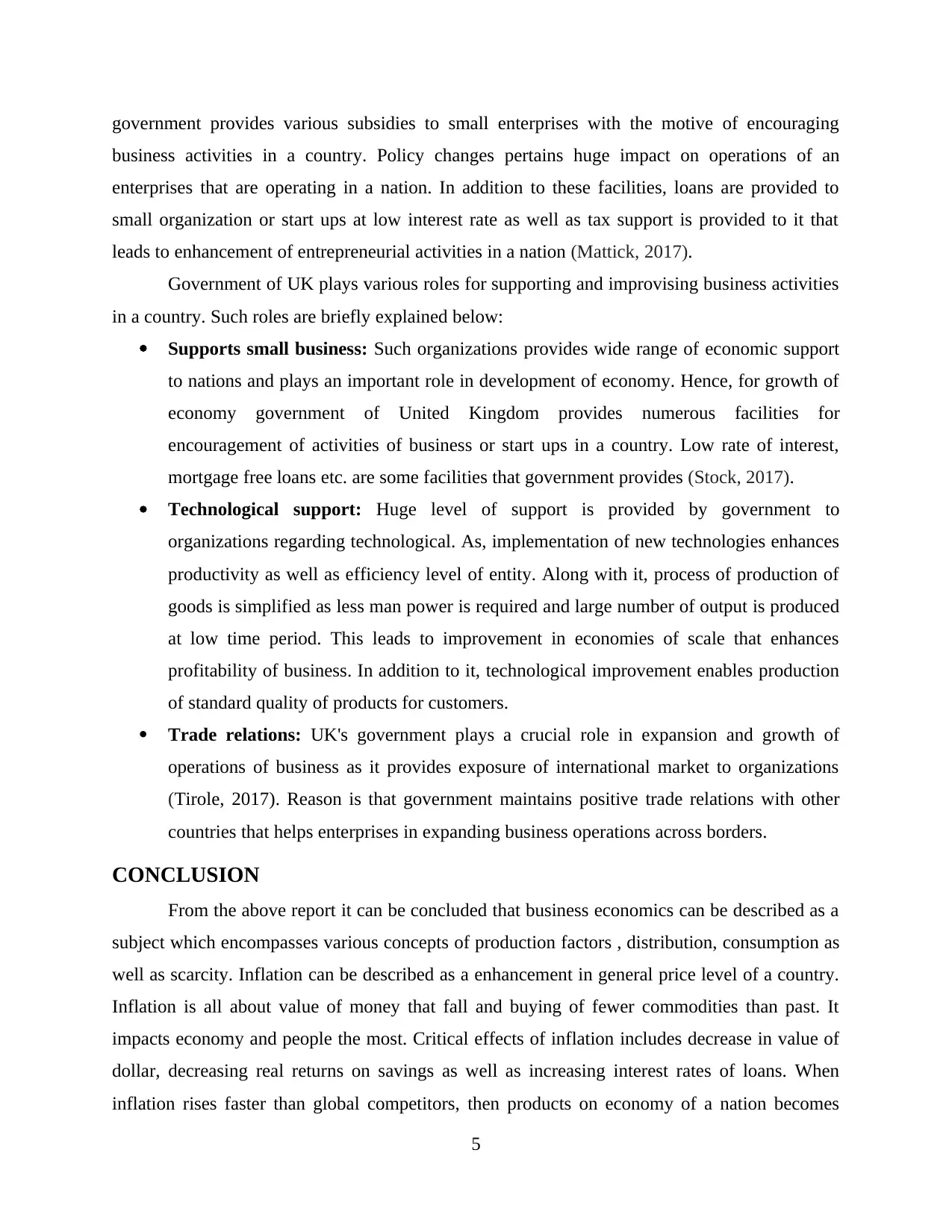
government provides various subsidies to small enterprises with the motive of encouraging
business activities in a country. Policy changes pertains huge impact on operations of an
enterprises that are operating in a nation. In addition to these facilities, loans are provided to
small organization or start ups at low interest rate as well as tax support is provided to it that
leads to enhancement of entrepreneurial activities in a nation (Mattick, 2017).
Government of UK plays various roles for supporting and improvising business activities
in a country. Such roles are briefly explained below:
Supports small business: Such organizations provides wide range of economic support
to nations and plays an important role in development of economy. Hence, for growth of
economy government of United Kingdom provides numerous facilities for
encouragement of activities of business or start ups in a country. Low rate of interest,
mortgage free loans etc. are some facilities that government provides (Stock, 2017).
Technological support: Huge level of support is provided by government to
organizations regarding technological. As, implementation of new technologies enhances
productivity as well as efficiency level of entity. Along with it, process of production of
goods is simplified as less man power is required and large number of output is produced
at low time period. This leads to improvement in economies of scale that enhances
profitability of business. In addition to it, technological improvement enables production
of standard quality of products for customers.
Trade relations: UK's government plays a crucial role in expansion and growth of
operations of business as it provides exposure of international market to organizations
(Tirole, 2017). Reason is that government maintains positive trade relations with other
countries that helps enterprises in expanding business operations across borders.
CONCLUSION
From the above report it can be concluded that business economics can be described as a
subject which encompasses various concepts of production factors , distribution, consumption as
well as scarcity. Inflation can be described as a enhancement in general price level of a country.
Inflation is all about value of money that fall and buying of fewer commodities than past. It
impacts economy and people the most. Critical effects of inflation includes decrease in value of
dollar, decreasing real returns on savings as well as increasing interest rates of loans. When
inflation rises faster than global competitors, then products on economy of a nation becomes
5
business activities in a country. Policy changes pertains huge impact on operations of an
enterprises that are operating in a nation. In addition to these facilities, loans are provided to
small organization or start ups at low interest rate as well as tax support is provided to it that
leads to enhancement of entrepreneurial activities in a nation (Mattick, 2017).
Government of UK plays various roles for supporting and improvising business activities
in a country. Such roles are briefly explained below:
Supports small business: Such organizations provides wide range of economic support
to nations and plays an important role in development of economy. Hence, for growth of
economy government of United Kingdom provides numerous facilities for
encouragement of activities of business or start ups in a country. Low rate of interest,
mortgage free loans etc. are some facilities that government provides (Stock, 2017).
Technological support: Huge level of support is provided by government to
organizations regarding technological. As, implementation of new technologies enhances
productivity as well as efficiency level of entity. Along with it, process of production of
goods is simplified as less man power is required and large number of output is produced
at low time period. This leads to improvement in economies of scale that enhances
profitability of business. In addition to it, technological improvement enables production
of standard quality of products for customers.
Trade relations: UK's government plays a crucial role in expansion and growth of
operations of business as it provides exposure of international market to organizations
(Tirole, 2017). Reason is that government maintains positive trade relations with other
countries that helps enterprises in expanding business operations across borders.
CONCLUSION
From the above report it can be concluded that business economics can be described as a
subject which encompasses various concepts of production factors , distribution, consumption as
well as scarcity. Inflation can be described as a enhancement in general price level of a country.
Inflation is all about value of money that fall and buying of fewer commodities than past. It
impacts economy and people the most. Critical effects of inflation includes decrease in value of
dollar, decreasing real returns on savings as well as increasing interest rates of loans. When
inflation rises faster than global competitors, then products on economy of a nation becomes
5
Paraphrase This Document
Need a fresh take? Get an instant paraphrase of this document with our AI Paraphraser

relative uncompetitive which results in lower demand for products as well as Sterling that causes
depreciation in rates of exchange. In an economy, inflation matters mots as it effects on values
associated to wages, savings, etc.
6
depreciation in rates of exchange. In an economy, inflation matters mots as it effects on values
associated to wages, savings, etc.
6
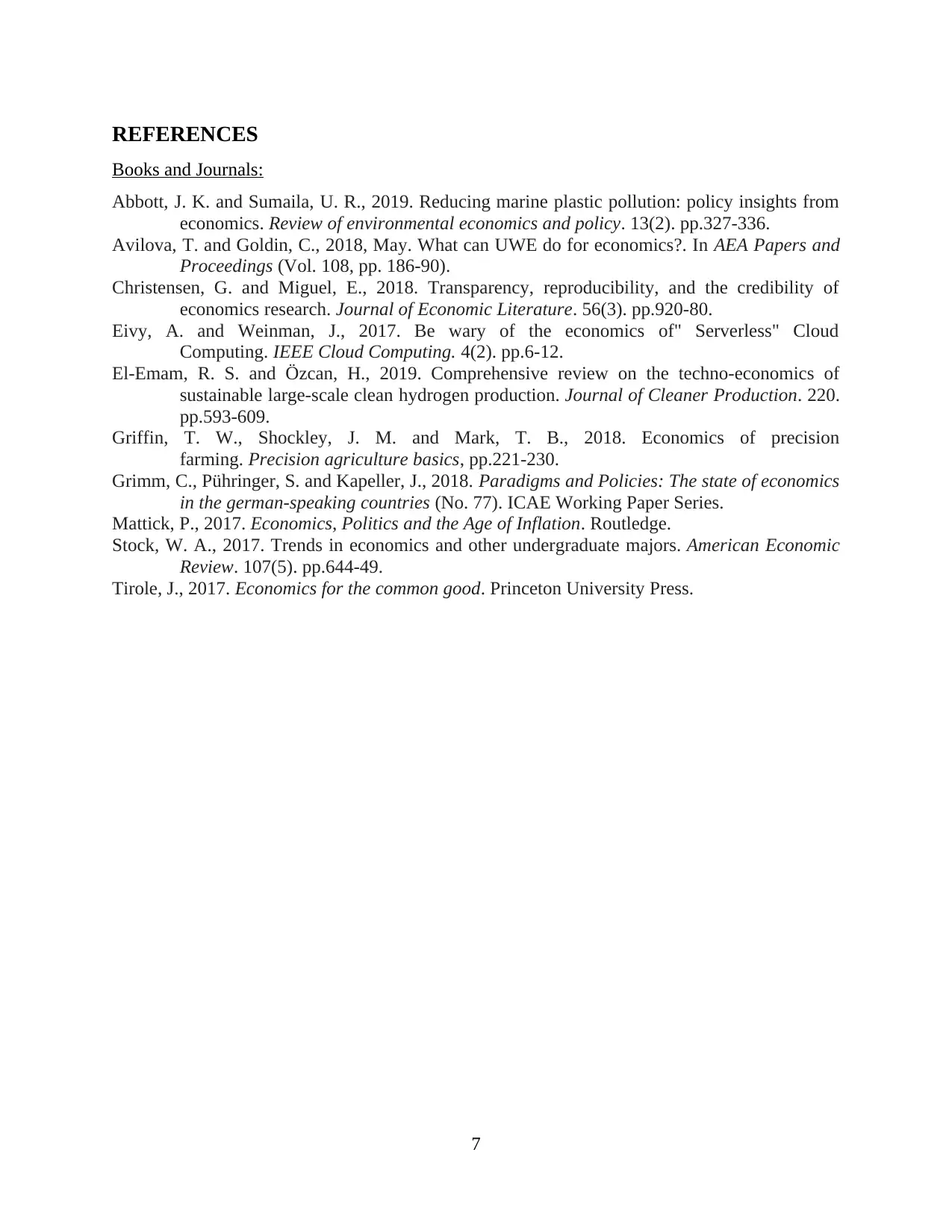
REFERENCES
Books and Journals:
Abbott, J. K. and Sumaila, U. R., 2019. Reducing marine plastic pollution: policy insights from
economics. Review of environmental economics and policy. 13(2). pp.327-336.
Avilova, T. and Goldin, C., 2018, May. What can UWE do for economics?. In AEA Papers and
Proceedings (Vol. 108, pp. 186-90).
Christensen, G. and Miguel, E., 2018. Transparency, reproducibility, and the credibility of
economics research. Journal of Economic Literature. 56(3). pp.920-80.
Eivy, A. and Weinman, J., 2017. Be wary of the economics of" Serverless" Cloud
Computing. IEEE Cloud Computing. 4(2). pp.6-12.
El-Emam, R. S. and Özcan, H., 2019. Comprehensive review on the techno-economics of
sustainable large-scale clean hydrogen production. Journal of Cleaner Production. 220.
pp.593-609.
Griffin, T. W., Shockley, J. M. and Mark, T. B., 2018. Economics of precision
farming. Precision agriculture basics, pp.221-230.
Grimm, C., Pühringer, S. and Kapeller, J., 2018. Paradigms and Policies: The state of economics
in the german-speaking countries (No. 77). ICAE Working Paper Series.
Mattick, P., 2017. Economics, Politics and the Age of Inflation. Routledge.
Stock, W. A., 2017. Trends in economics and other undergraduate majors. American Economic
Review. 107(5). pp.644-49.
Tirole, J., 2017. Economics for the common good. Princeton University Press.
7
Books and Journals:
Abbott, J. K. and Sumaila, U. R., 2019. Reducing marine plastic pollution: policy insights from
economics. Review of environmental economics and policy. 13(2). pp.327-336.
Avilova, T. and Goldin, C., 2018, May. What can UWE do for economics?. In AEA Papers and
Proceedings (Vol. 108, pp. 186-90).
Christensen, G. and Miguel, E., 2018. Transparency, reproducibility, and the credibility of
economics research. Journal of Economic Literature. 56(3). pp.920-80.
Eivy, A. and Weinman, J., 2017. Be wary of the economics of" Serverless" Cloud
Computing. IEEE Cloud Computing. 4(2). pp.6-12.
El-Emam, R. S. and Özcan, H., 2019. Comprehensive review on the techno-economics of
sustainable large-scale clean hydrogen production. Journal of Cleaner Production. 220.
pp.593-609.
Griffin, T. W., Shockley, J. M. and Mark, T. B., 2018. Economics of precision
farming. Precision agriculture basics, pp.221-230.
Grimm, C., Pühringer, S. and Kapeller, J., 2018. Paradigms and Policies: The state of economics
in the german-speaking countries (No. 77). ICAE Working Paper Series.
Mattick, P., 2017. Economics, Politics and the Age of Inflation. Routledge.
Stock, W. A., 2017. Trends in economics and other undergraduate majors. American Economic
Review. 107(5). pp.644-49.
Tirole, J., 2017. Economics for the common good. Princeton University Press.
7
⊘ This is a preview!⊘
Do you want full access?
Subscribe today to unlock all pages.

Trusted by 1+ million students worldwide
1 out of 9
Related Documents
Your All-in-One AI-Powered Toolkit for Academic Success.
+13062052269
info@desklib.com
Available 24*7 on WhatsApp / Email
![[object Object]](/_next/static/media/star-bottom.7253800d.svg)
Unlock your academic potential
Copyright © 2020–2026 A2Z Services. All Rights Reserved. Developed and managed by ZUCOL.





